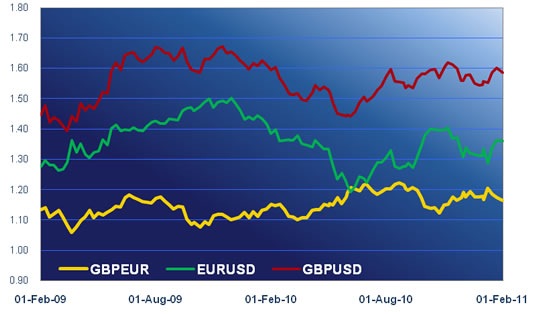Good morning. A survey of UK retail customers has found that only 40% of them are unhappy with their bank. The banks themselves are delighted that the level of dissatisfaction is so low. A spokesman for one of them said the survey result would be an encouragement to make savings on customer service, which is obviously at an unnecessarily high level.
| Technical levels | |||||||||||||
|
|||||||||||||
| Economic releases | |||||||||||||
|
|||||||||||||
The consumer cannot blacklist every bank from A to Z at the same time. Modern life makes it necessary to use the services of at least one; the aim is to pick the one you dislike least. To an extent it is the same with currencies but at least for investors there is an alternative. Instead of holding currency A or currency B they can hold “stuff”; equities, commodities, metals or whatever. Many have taken advantage of that option. That is why oil and gold are so expensive these days. And that is partly why inflation in Britain is so high. The other reason is the increases in sales tax that took place in January 2010 and last month. For calendar 2010 the VAT rise from 15% to 17.5% meant roughly 2% on the rate of inflation. This year the further increase to 20% will mean another 2% on prices. (The impact is lower than the maths would suggest because not all goods and services are VAT-able.)
The Monetary Policy Committee (MPC) decided again yesterday that higher interest rates would not be a useful response to increased rates of tax. Investors were happy to forgive sterling for the MPC’s failure to raise the Bank Rate because they had never really expected it to happen so soon. The pound did spike lower but only briefly. Sterling’s supporters have put their optimism on hold, hoping that next week’s Inflation Report and the following week’s MPC minutes will give them the excuse they need to take the currency ahead.
There had been no greater market reaction to figures earlier in the day showing a slight -0.1% fall in UK manufacturing production during December. The broader industrial production figure was on target at 0.5%. Investors were evidently geared up for softer numbers because of the awful weather during the month. Their tolerance also apparently extended to the -0.1% by which the NIESR said gross domestic product contracted during January. In the hour and a half following the announcement sterling went up by nearly a cent. It was unable to hold onto the gain though. In the evening the US dollar moved ahead against everything, hauling the Canadian dollar in its wake. The refusal of Egyptian president Hosni Mubarak to stand down will have contributed to its progress overnight but it was already heading higher before that news came out.
Germany has set the ball rolling today with January’s consumer price index data. Although CPI went down by -0.4% on the month, the annual rate of inflation increased from 1.7% to 2.0%. There was no reaction to the news from the euro. Britain is next up with the producer price index figures. They are expected to show a continuing squeeze on manufacturers’ gross margins with costs up by 12.7% on the year and factory gate prices rising by just 3.0%. After lunch Canada and the United States publish their trade figures for December and the University of Michigan releases its provisional index of consumer sentiment.
That Michigan sentiment number is the one most likely to make things happen but it is also possible that the market may try to make some big inflationary deal of the UK PPI figures. Be ready also for a further reaction to the developments in Egypt. Nobody is revving up their tanks yet but the unlikeliest of things have been known to happen in that neck of the woods. Have a good weekend.






